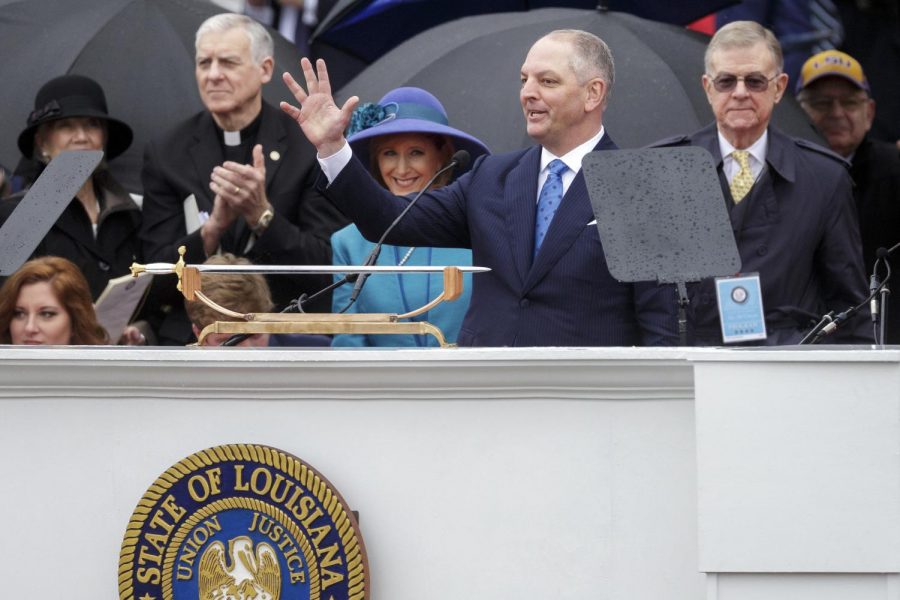Louisiana Governor John Bel Edwards sworn in for second term
Louisiana Gov. John Bel Edwards waves to the crowd during his inauguration at the state Capitol in Baton Rouge, La., Monday, Jan. 13, 2020. He was reelected in November.
January 13, 2020
Louisiana Governor John Bel Edwards began his second term Monday without the budget crises that crowded out other debates across his first four years, but with a more conservative Legislature that could create new clashes over spending.
The 53-year-old Democrat took his oath of office on the steps of the Louisiana Capitol, in a rainy ceremony overshadowed by the college football national championship between LSU and Clemson in New Orleans. The game sidelined the traditional black-tie inaugural ball, as Edwards and many other Louisiana officials planned to be in the Superdome on Monday night to watch LSU.
The swearing-in ceremony followed a tightly-coordinated script of pageantry laid out through years of gubernatorial inaugurations.
The Deep South’s only Democratic governor, Edwards stunned Republicans with his reelection victory in the ruby red state — overcoming President Donald Trump’s efforts to unseat him. The moderate governor drew enough cross-party support for a win with his focus on bipartisan, state-specific issues.
He continued the theme at his inaugural ceremony, again dubbed “Louisiana First.”
Six other Republican statewide elected officials also were sworn in for new terms Monday: Lt. Gov. Billy Nungesser, Secretary of State Kyle Ardoin, Attorney General Jeff Landry, Treasurer John Schroder, Agriculture Commissioner Mike Strain and Insurance Commissioner Jim Donelon.
The 144-member Legislature was seated Monday morning, and elected its leaders. Republican Sen. Page Cortez of Lafayette became Senate president, while GOP Rep. Clay Schexnayder of Gonzales was chosen to be House speaker, in a contentious vote that splintered Republicans.
A West Point graduate and former Army Ranger, Edwards was a state House lawmaker when he won the governor’s seat in the 2015 election. In his first term as Louisiana’s 56th governor, he expanded Medicaid, lowering the state’s uninsured rate below the national average, and championed a bipartisan rewrite of criminal sentencing laws that reduced the prison population.
The term was marked by disputes with House Republicans over how to stabilize Louisiana’s finances and end the cycle of hefty budget gaps Edwards inherited from former Gov. Bobby Jindal.
Edwards and the House GOP wrangled about finances across 10 legislative sessions over three years before agreeing on a package of tax increases that ended the shortfalls. In the final year of the term, Edwards and lawmakers plugged new money into teacher pay raises, early childhood education and investments in public colleges.
The governor is proposing another round of hikes in education spending this year, but Edwards will be negotiating for boosted spending with a more conservative Legislature and with lawmakers who ran on cutting taxes and curbing government. Many moderate Republicans, particularly in the Senate, were forced out by term limits. The next legislative session begins in March.
The inauguration will feature a 19-cannon salute; a flyover by F-15s with the Louisiana National Guard; and a prayer and hymns sung by college choirs. Actress Lynn Whitfield, a Baton Rouge native, will read the Maya Angelou poem “Continue.” The governor will be sworn in by Louisiana Supreme Court Chief Justice Bernette Johnson.
Among those attending the ceremony were Jindal and former Gov. Edwin Edwards, along with most of Louisiana’s congressional delegation.
The governor started the day with an invitation-only Catholic mass at a cathedral near the Capitol.
Instead of the inaugural ball, Edwards was having an “inauguration reception” Monday afternoon in New Orleans at the House of Blues, to celebrate with supporters and still make it to the national championship.
The administration didn’t provide an estimate of the inauguration’s cost. Money for the event is raised through private donations from supporters. Contributions are limited to $5,000 per person under state law, and the governor must file a report detailing the donations and spending with the state ethics office within 60 days of the inauguration ceremony.







